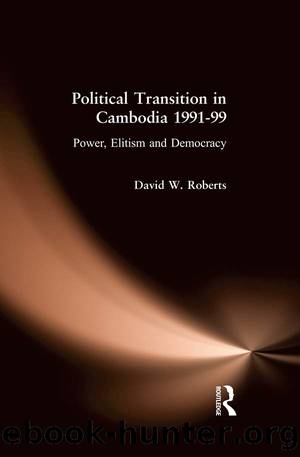Political Transition in Cambodia 1991-99 by David Roberts

Author:David Roberts [Roberts, David]
Language: eng
Format: epub
ISBN: 9781136850547
Barnesnoble:
Publisher: Taylor & Francis
Published: 2016-04-29T00:00:00+00:00
After the Elections
By July 1993, a form of relative political stability in Cambodia appeared to have replaced the violence, intimidation and harassment of the immediate post-electoral trauma. Such conditions, despite not reflecting the technical mandate of the peacekeepers, or the actual outcome of the poll, served to inspire not a little hope that Cambodia would from this point be released from the externally-applied political bonds that had arrested its development opportunities in the wake of the Pol Pot disaster.
Whilst the system of government emplaced after the UNTAC election bears no comparison with that employed during the Pol Pot regime, it was far from healthy, by most standards. A highly inefficient system of dual-managed ministries throughout the Executive reflected and reinforced the ambiguities of powersharing and clientelism in such a deeply cleaved political culture. As a response to the CPPâs refusal to surrender its positions, and to FUNCINPECâs natural desire to assert itself in government and administration, as well as Ranariddhâs tendency to regal absolutism, FUNCINPEC brought its own representatives to match those employed by the CPP. In the absence of such a strategy, political power would have resided even more obviously in the hands of the CPP. Ranariddh would have been limited in the manner in which he could disburse to his clients what little he effectively had.
However, this was not the only motivation for FUNCINPEC. The denial of access to ârewardingâ jobs in government undermined Ranariddhâs capacity to act as patron and distribute largesse for loyalty. In return for support of the party, the elite had promised positions of authority and privilege to its activists and its financiers as a reward for party loyalty. This process has precedent and tradition in Cambodia. Although the formal system of reward for people of status died out during the period of the French protectorate, Vickery argues that âthe mentality that accompanied it persisted. All state employment ⦠was still ranked on a scale of desirability according to the opportunity it provided for private benefitsâ¦â.21 A little over a century after the beginning of the French experience, Veng Sereyvudh, a senior member of FUNCINPEC, stated that âthe price list quoted by FUNCINPEC officials for jobs in the administration ranges from 200 USD to 3,000 USD, depending on how good the position will be for extracting bribesâ. He added that this was âbound to happen [as] ⦠FUNCINPEC is more vulnerable to corruption because they come with empty hands and they need housesâ.22 CPP President Chea Sim stated that FUNCINPEC members were all competing for posts in the National Assembly.23 Lao Mong Hay confirms this system. He notes that
the Royalist party got their houses and villas. Whoever got closest to Ranariddh gets more favours. Strong organisation is lacking. They wanted power and then they became drunk with it and neglected the necessary consolidation of their already fragmented and inexperienced party.24
Frieson noted that this system was âabundantly clear after the election, when huge crowds of khsae members formed outside the offices of the FUNCINPEC party in Phnom Penh to try to cash in on their support by gaining a job in the new governmentâ.
Download
This site does not store any files on its server. We only index and link to content provided by other sites. Please contact the content providers to delete copyright contents if any and email us, we'll remove relevant links or contents immediately.
| Africa | Americas |
| Arctic & Antarctica | Asia |
| Australia & Oceania | Europe |
| Middle East | Russia |
| United States | World |
| Ancient Civilizations | Military |
| Historical Study & Educational Resources |
Never by Ken Follett(2941)
Machine Learning at Scale with H2O by Gregory Keys | David Whiting(2352)
The Man Who Died Twice by Richard Osman(2327)
Fairy Tale by Stephen King(2126)
Will by Will Smith(2099)
Rationality by Steven Pinker(1790)
The Dark Hours by Michael Connelly(1601)
The Dawn of Everything: A New History of Humanity by David Graeber & David Wengrow(1599)
Principles for Dealing With the Changing World Order: Why Nations Succeed and Fail by Ray Dalio(1401)
Friends, Lovers, and the Big Terrible Thing by Matthew Perry(1372)
A Short History of War by Jeremy Black(1318)
HBR's 10 Must Reads 2022 by Harvard Business Review(1271)
Go Tell the Bees That I Am Gone by Diana Gabaldon(1259)
Can't Hurt Me: Master Your Mind and Defy the Odds - Clean Edition by David Goggins(1254)
515945210 by Unknown(1224)
Fear No Evil by James Patterson(1129)
443319537 by Unknown(1086)
Works by Richard Wright(1029)
Going There by Katie Couric(1004)
